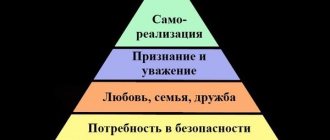Genuine human needs are those needs without which human existence is impossible, and in modern society these needs are usually satisfied almost completely. In Maslow’s pyramid of needs, a person’s genuine needs are at the very base of the pyramid and are called basic (physical), but in addition to basic needs, there are also higher needs and they can also be genuine, only they are more individual. For example, a genuine need can be called the desire to develop spiritually if a person loves music and wants to play the guitar and this desire is not imposed on him from the outside.
Main types
Needs can be material (physical) and spiritual (mental). Some philosophers believe that such a division is true only for humans. Other experts say that many animals also feel the need for communication and feel uncomfortable in isolation from their relatives. This is an example of a spiritual, or mental, need. Physical needs are the need for some material items. A person needs food and water, clothing to maintain a comfortable body temperature, and an impressive list of items that are customary to use in a particular culture. The desire to communicate with other people, experience feelings, learn something new - all these are spiritual needs. It is not at all difficult to give an example of needs of this type. Suppose a person moves alone to a foreign country. He feels lonely, and discomfort is also caused by his lack of knowledge of the language and a vague understanding of the local culture and religion. Accordingly, there is a need to make new acquaintances for regular friendly communication and a desire to learn more about the mentality and mindset of local residents.
REALIZE
First we need to learn to recognize what we need. Without this, there will only be continuous habits, automatisms and self-abuse. So far I have not come up with anything better answers to the questions:
- what am I feeling now?
- Why do I do what I do?
- What do I need now from my needs?
- what do I want?
As soon as I catch myself thinking that something is wrong and nothing makes me happy, I stop working, move to another place and open a Google form with prepared questions. Something wrong:
- I get distracted by social media;
- I get irritated;
- I'm bored and don't know what to do;
- I get stuck in pictures or not very interesting articles;
- I replay in my head a conversation with my wife or friend;
- I want something, but I don’t know what.
This all sounds a lot like fatigue. Previously, I tried to get rid of irritants and return to business by force of will, but I realized that this does not work: the energy is spinning, nothing is cloudy. When I understood the principle of operation of the prefrontal cortex and realized that it needed rest, things went well, but I still didn’t go well with identifying needs. Therefore, the rule now works: in any incomprehensible situation, answer the prepared questions.
ON AUTOMATIC
I’m working, I feel like my concentration has gone, I’m constantly distracted. It's noon - there's still a lot of work time, you need to tighten up and return your attention to work. I don’t understand what to do, my mood is spoiled.
CONSCIOUSLY
I understand that I am distracted, I move to another place and answer questions. I stop doing what I was doing and open up questions.
We have already talked about the benefits of recording emotions, but I will repeat it. Writing helps me get out of the context of thoughts in which I am immersed right now and redirect my attention. When you concentrate on describing feelings, the focus shifts, and the brain hamster moves away from the circular distance. This allows you to look at yourself from the outside even in conflict situations.
The main thing is to switch and start responding. Subsequently, you don’t have to re-read the entries, although sometimes it is interesting to remember how I reacted to certain things five years ago.
Last year I fell in love with Google Forms because they were free and easy. Answering using a ready-made form is easier than remembering or looking for questions - the likelihood of forgetting due to laziness is reduced. Open it - write, it’s simple. But laziness still regularly strikes. It’s physically difficult to explain to myself that this is useful, so I try to concentrate on the feeling of relief and clarity that comes as I answer. The more victories you have, the easier it becomes over time.
It still bothers me a little that I look like an idiot who cannot control his own desires and every time he gets tired, like a robot, he goes to answer questions. But this is because I am still unconscious and stupid.
Necessity or desire?
There are also imaginary and genuine human needs. Anyone can find examples by understanding themselves. Suppose at the moment you want to buy a new expensive car and you feel hungry. Which of these two needs is more important and more urgent? Of course, this is a physical desire to eat. But acquiring new things is not always an imaginary need. Let's say you want a car because you live in the suburbs and spend too much time and energy commuting to work on public transport every day. If purchasing personal transport will bring you benefits (saving time, the opportunity to increase earnings), and you only want to get a means of transportation, this is a real need. In the case when you already own a car, but you want to buy a more expensive and prestigious car, your desire can be described as an imaginary need.
Attractions
Attraction
- an instinctive desire that prompts an individual to act in the direction of satisfying this desire. A mental state that expresses the unconscious need of the subject, which already has an emotional connotation, but is not yet associated with the promotion of conscious goals.
Attraction is characterized by four aspects: source, goal, object and force (energy).
Freud identifies the following types of drives:
1) attraction to life - life-affirming; their goal is the preservation and development of life in all its aspects; this includes sexual drives and the drive for self-preservation; 2) attraction to death, aggression, destruction; they are understood as inherent in the individual, usually unconscious, tendencies towards self-destruction and return to an inorganic state.
* Virtual class of school No. 185 in Nizhny Novgorod/Social studies lessons in 10th grade
Primary Needs
The basic needs of man are those determined by nature itself. Any living organism needs nutrition and fluid. If these needs are not regularly met, a person, animal or plant will simply die. Another important natural process is breathing; therefore, it is appropriate to say that fresh air is a natural need of the body. Rest after work, sleep after prolonged wakefulness and physical activity after rest are also natural needs. An example of this type of need is both fear of a threat to life (instinct of self-preservation) and the desire to have sexual intercourse with a representative of the opposite sex.
SOUND → DO
Two rules help you voice your needs.
The first thing is not to complain or shift responsibility to someone else. To do this, it is important to allow your experiences without complaints.
WITH CLAIM
I'm such a fool that I can't concentrate. Why can't I pull myself together and change something in my life?
ABOUT ME
I'm tired, I'm bored. I'm bored sitting at home and want to be active. I'll go to the skating rink.
When you scold yourself or shift responsibility for your well-being to circumstances or to other people in general, you are overstepping the boundaries and area of your responsibility. Unfortunately, it doesn’t work like that: it’s all aggression and violence - towards yourself or others.
The second rule is to formulate the need clearly, specifically and for implementation here and now. Without this, it is unclear what to do, and the other person may even perceive it as a threat.
ABSTRACT
I'm tired and don't want to work. I want us to spend more time together.
SPECIFICALLY
I’m tired: I’ll go to the cinema for an afternoon session, and then I’ll see what I do. Sit with me for 10 minutes.
This is all to the principle “we lack clarity, not motivation.”
Is it possible to survive without satisfying basic needs?
We know what a person needs by nature. Most of these needs are vital. If a person stops drinking or eating, he will die after a while. Death can also occur due to severe hypothermia or overheating of the body. The same is true with physical fatigue or constant relaxation. It is important to understand that all natural needs must be met in the correct quantities. This will help maintain health and well-being until old age. By incorrectly assessing your needs, you only cause harm to your own body. Food and drink are genuine needs. Examples of their improper satisfaction can be found in modern society at every step. By choosing unhealthy foods or instead of clean water - carbonated drinks, canned juices and alcohol, a person seems to satisfy the need (calories received, the feeling of hunger and thirst has really subsided), but this does not bring any benefit to his health.
Clients with imaginary needs.
The average salesperson is forced almost every day to deal with clients who have imaginary needs. A distinctive feature of such clients is that they usually know what product they need, but cannot explain why and why. Moreover, it is highly undesirable to argue with them; this will cause open negativity and misunderstanding. If you have the product they need in stock, sell it and forget it. If there is no product, then it will be effective to use the method
Needs and requirements
According to Philip Kotler, “need is the lack of something necessary that is felt by a person.” Needs are inherent in every person from birth, their number is limited and stable (hunger, thirst, sleep, etc.). They are determined by human physiology, without their satisfaction life is impossible. Need is what unites people. Their set is the same for everyone; they exist a priori, and are not created by society or marketing activities.
Need is a specific form of manifestation of need and depends on the historical period, cultural, national, and personal characteristics of the consumer. Needs are what divide people. Needs change and are influenced by social forces and marketing activities. Needs are transformed into demand for goods if they are supported by the financial ability to satisfy and the desire to buy. Marketing tries to influence needs by creating demand by making the product attractive and accessible.
John Kenneth Galbraith believed that if a need is truly felt, then the production of a product is useful, while at the same time advertising is responsible for creating needs in order to “create desires that did not previously exist.” In this case, there is an artificial need. Marketing creates needs and demand, and this activity should be carried out on the basis of social responsibility. Needs that cannot be transformed into demand through low purchasing power become the cause of psychological discomfort and create social tension. The influence of the media can lead to the emergence of needs that contradict ethical and moral standards.
“False” and “real” needs
French researchers Jean Marie Guyot and Jacques Attali developed a theory of false and real needs. Real needs are based on needs, and “false” needs are created by society and the manufacturer. In addition, they believe that “false” needs are formed artificially and, as a result, begin to be considered “normal and natural.” A dependence on certain goods begins to form and they become a need.
Absolute and relative needs
John Maynard Keynes classifies needs into absolute and relative. By absolute he understands needs that do not have a level of satisfaction, they are either satisfied or not. By relative - needs that have a level of satisfaction. Relative needs cannot be satisfied, because the higher their level, the greater the desire. exceed this level. Satisfaction of absolute needs is possible, but relative needs are not. Even in the pursuit of material comfort, it is impossible to objectively determine the level that would correspond to satisfaction. When a person reaches the level defined as the target, she begins to predict a new stage of possible improvement.
Often, people whose standard of living has improved in absolute terms tend to feel that their situation has worsened if those whom they always considered as objects of comparison began to live better than them.
(J.M. Keynes).
Generic and derived requirements
Lyman Abbott divided needs into generic and derivative, or quasi-needs. A derived need is a technological response (product) to a generic need. For example, a car is a derived need relative to the generic need for individual means of transportation. It is impossible to saturate a generic need, unlike a derived need. The marginal utility of a derived need tends to decrease. However, the generic need is not saturated, since the consumer buys new improved goods and, therefore, meets new derived needs. These derived needs, in turn, are saturated and then changed with the help of new, improved goods. This illustrates the product life cycle model. The saturation of derived needs occurs at two levels: firstly, when improving the technical characteristics of goods (more economical cars) and, secondly, when replacing one technological solution with another, which has higher parameters (flash cards replace CDs) .
Psycho-emotional needs
Every person strives to learn and obtain new information. Depending on the range of interests, one individual wants to read a scientific encyclopedia and then write his own essay article, while another wants to study the latest issue of a glossy magazine from cover to cover. Learning something new, thinking and drawing conclusions are all psychological needs. The example of needs of this type given above clearly shows that very often human needs are not so easy to classify. The desire to purchase a magazine or book is a material need, since we are talking about the possession of a real object. But at the same time, a printed publication is purchased to obtain information, that is, to satisfy the spiritual need for new knowledge.
False needs as the desire to harm oneself
Friedrich Nietzsche once said something like this: I consider an animal, a species, an individual, sick if it chooses, if it prefers something that is harmful to it.
This phrase contains the whole meaning of human false needs. Each of them causes harm in the long run. The endless desire to own the latest car model destroys the family budget.
Adverse habits, excitement, show-off, thirst for universal adoration lead a person away from his goals. When they tell him that he needs to give up flour, sweet, salty, fatty, fried foods, how many people do this? When it was explained to people that an unsecured loan was created to enslave the people and make them poor, how many understood the message?
If true needs are based on achieving a sufficient level of vital activity, then false needs are based on euphoria. In the first case, it is impossible to make a person dependent, since he stops after receiving what he needs.
Such a person is not capable of bringing serious benefit to the economy; he is not beneficial to either business or the state. The system understands that such a population will be happy, but will not turn into a resource.
As we know, a person’s happiness is not the task of the state. A person should be satisfied, but not happy. This state of affairs forces him to feel thirsty, drive himself into dependence and slavery, and spin like a squirrel in a wheel.
Therefore, the emphasis is on false needs, which are satisfied and then withdrawn, so the slave must escape again.
Life in society
There is another branch of psycho-emotional needs - communication needs. Any person has a desire to communicate with other people, establish close relationships, help or receive help, and so on. The desire to work, gain a certain status in society and actively participate in the lives of people around us are social needs. Everyone can find examples in themselves: this is the desire to create a strong and happy family or achieve professional heights. Do not forget about political and social activities; any thoughts or actual work in these industries also belongs to the social sphere.
Interests
Interest
(from Latin interest - matters, important) - 1) in sociology - the real reason for social actions, underlying the immediate motivations - motives, ideas, etc. - of the individuals and social groups participating in them; 2) in psychology - a person’s attitude towards an object as something valuable and attractive to him.
People's interests are based on their needs, but are directed not so much at the objects of need as at those social conditions that make these objects more or less accessible. Interests depend on the position in society of certain groups of the population.
Based on their focus, interests are divided into economic, social, political, and spiritual.
Existential needs
Philosophical questions about the meaning of life today do not have clear answers. Each person decides for himself what is most important to him and what his main mission is. It is impossible to exist without thinking at least periodically about your life. Finding answers to philosophical questions and determining one’s place in life are existential needs. Examples can be found in a particular person's conversion to religion or attempts to create their own theories. It is important for each individual to maintain a sound mind and find the most suitable explanation for everything that is happening. Nowadays, it is not necessary to invent something new - there are many religious and scientific theories. Some people are also satisfied with mystical explanations of the meaning of life.
False human needs - what are they?
Maslow did not know how much marketing would begin to develop in the coming years. If he had known about the capabilities of modern sales professionals, he would probably have taken a different look at a person's approach to needs. Maslow described basic needs in detail, but they have ceased to work in the modern world.
A girl gets married, she has a loving husband, a roof over her head, her family lives in abundance, everyone is healthy, they have the opportunity to do what they love, study, and realize their talents. And suddenly a divorce.
A man meets the one, she agrees to marry him, they have children, work, hobbies, income, and a quality intimate life. And suddenly he begins to cheat, gamble, and drown in addiction. What's wrong with these people? What are they missing?
Satisfaction of basic needs does not make a person happy, it only gives a feeling of calm and security. The individual cannot stop there; he begins to thirst for something more.
The desire to receive, own and achieve leads a person to a fork in the road between two types of needs, about which psychologists of the last century said nothing. True and false needs rise above the basic ones and determine future fate.
Both true and false needs are insatiable, that is, they do not have clear boundaries. For example, eat delicious food and learn something new. Both can be done indefinitely.
True needs lead to development, false needs lead to degradation and alienation. It’s worth noting right away that marketers have long identified weaknesses in human psychology, so it’s more effective to influence false needs.
Henry Ford came up with a great way to increase sales of his cars. High quality and necessary functionality quickly satisfied the true needs of car enthusiasts, and they suddenly stopped changing cars with happy faces.
They were satisfied with everything, they were happy. Then the cunning Henry decided to press other levers and satisfy the false needs of man, namely the desire to be better than others, to demonstrate his superiority, to show off.
Ford simply released a car with modified body elements and a couple of additional features. Now the previous owners had a car, but it was old. Worse than the neighbor's. His car didn't have what others had.
Even if he doesn’t need it personally. People rushed to sell their cars and buy new ones. But soon the trick was repeated. Then again and again. Leading automakers release an updated model at least once every 3 years.
Apple has mastered the principle of influencing false human needs best of all. Although others are not far behind. Marketing only benefits from man's pursuit of his false needs.
And the person himself suffers, because the goal of this race is degradation, addiction, debt, hard work, a feeling of fatigue, dissatisfaction with one’s own life, harm to mental and physical health.
Suppressing hunger is a basic need. The desire to eat high-quality, healthy foods is a true need.
The desire to eat tasty food is a false need. Marketers know this, so seasonings, spices, sweeteners and other attributes of the so-called taste have become a tool for involving a person in a game where the main winner is the seller of the product.
Obesity, disruption of the functioning of organs and organ systems, aggravation of existing diseases, these are a small part of the consequences that we receive.
Find and understand yourself
Another important psychological need is to be clearly aware of yourself and your own thinking. A person must perceive himself as a unit, distinguish his own thoughts and desires from those imposed by others. It turns out that freedom of thought and inner harmony are also spiritual needs? Examples for this question are sometimes sad. The inability to understand and recognize oneself leads to psychological problems of various types and levels of complexity. These needs are natural and must be satisfied. Otherwise, it is difficult to talk about a person as a full-fledged individual. The conclusion suggests itself: physiological and psychological needs are for the most part equivalent. But at the same time, in each category you need to be able to distinguish between real and imaginary needs.
True and false human needs: is it possible to replace them?
Locally, you can refuse a greater share of imposed desires. Don’t take out loans, give up alcohol and tobacco, don’t eat baked goods, get off social networks.
But all this will only lead to alienation. The creators of the system know this. Give up alcohol and you will lose 80% of your friends. Say that you do not consume sweets and baked goods, and society will write you into the category of eccentrics. Are you not on social networks? Well, sit there without likes or communication.
Do you have a push-button phone? It satisfies your true needs, you can call, write SMS. But from now on you are a black sheep. And your car, even if it does everything that is required of it, is already old. This is the previous body, your neighbor has a new one!
As a result, we have a growing economy and the development of large businesses. And also an increase in diseases, a lack of clean drinking water, an increase in suicide and depression, divorce, betrayal, and fraud.
Based on the example of my activities, I can say that people, instead of opening a brokerage account and starting to create capital in order to live on dividends in the future, go to financial pyramids, because they are offered luxury there. Getting rich quick is that very false need. True lies in financial independence, but people are hardly interested in this.











